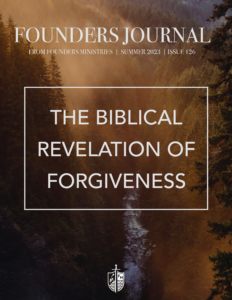As theology is the queen of sciences, so forgiveness is the queen of graces. It opens the door for all others and embodies all the justice, holiness, wisdom, and love that give form and matter to the saving operations of God’s grace. God’s having chosen a people of every generation and from every nation and people group to be his for all eternity made necessary the means by which this would be accomplished. Considering us as fallen and thus under condemnation and corrupt of heart, God’s decree of election involved everything necessary to maintain justice and moral purity in our eternal presence with him. Forgiveness constitutes the first grace, the first historically-accomplished salvific work, from which all blessings flow “to the praise of the glory of his grace” (Ephesians 1:6). If his elect are to be “holy and without blame before him” (Ephesians 1:4), their corruption of heart must be transformed toward holiness and their guilt must be removed. The first is done by the operation of the Holy Spirit in the New Birth (John 3:3-8), that great grace of the “washing of regeneration and renewal by the Holy Spirit” (Titus 3:5). In this work the elect sinner who is dead in trespasses and sins (Ephesians 2:4, 5) is made alive spiritually and, on his part, seeks union with Christ in his saving work. The spiritual dynamic, however, that sets this work of regeneration and consequent faith in motion is the objective reality of “redemption through his blood, the forgiveness of our trespasses” (Ephesians 1:7). That the moral perversity of “trespasses and sins” in which the deadness of the sinner consists has concretely and once-for-all received its just due at the cross brings about the gift of the Spirit. Paul’s argument throughout Ephesians proceeds on that assumption.
This order is germane to Paul’s argument also in Romans 4:23 through 5:11. Jesus was “delivered up because of our offenses” (Romans 4:25) and vindicated the work of God by which righteousness is imputed to the believer. On that basis, we find the transformation of tribulations into graces that result in perseverance, character, and hope—a hope that does not disappoint but grasps the coming reality of presence in the glory of God. Paul reiterates the order for his readers to enter more deeply into the initial grace of forgiveness. Having summarized the development (5:1-5), Paul goes back to the beginning. Before the “love of God was shed abroad in our hearts by the Holy Spirit,” a satisfaction of condemnation had to take place—“For when we were still without strength, in due time Christ died for the ungodly” (Romans 5:6). Paul wants to intensify the depth of this initiatory and pivotal grace in repeating, “God demonstrates His own love toward us, in that while we were still sinners, Christ died for us” (Romans 5:8). Then, to show the flow of grace, Paul gives a narrative of connection: “Much more then,”—look at the flood gates of grace now opened, and then the phrase repeated, “much more” (10)—“having been justified by his blood … from wrath”—never overlook the moment that our sin was punished and forgiven in our new Head (5:19). Again, “For if when we were reconciled to God through the death of his Son, much more having been reconciled, we shall be saved by his life” (Romans 5:10). All of the graces that flow from the living Christ come because first he has died to procure forgiveness. Even the regenerating work of the Spirit whereby we are brought experientially into the joy and freedom of his forgiveness-procuring death comes only to those for whom he has died. His holy labors operate effectually and internally on those who were in Christ in eternity and thus in Christ as he achieved the verdict, “There is therefore now no condemnation to those who are in Christ Jesus,” for only by that verdict can it be true that they “walk not according to the flesh, but according to the Spirit” (Romans 8:1).
Again, from forgiveness flow all other graces: “He who spared not his own Son but delivered him up for us all, how shall he not with him also freely give us all things? Who shall bring any charge against God’s elect? It is God who justifies. Who is he who condemns? It is Christ who died, and” because the price of sin had been paid and forgiveness justly and gloriously procured, “furthermore is risen” (Romans 8:32-34).
How fitting and truly a marvel of purity, mercy and wisdom in the revelation God gave to Moses In Exodus 34:6, 7: “The Lord, the Lord God, merciful and gracious, longsuffering and abounding in goodness and truth, keeping mercy for thousands, forgiving iniquity and transgression and sin, by no means clearing the guilty, visiting the iniquity of the fathers upon the children and the children’s children to the third and the fourth generation.” God is “keeping mercy” for the thousands of those whom he has chosen in Christ in whom they have redemption through his blood, the forgiveness of sins. He does not clear the guilty in defiance of his justice but in accordance with it as he set forth Christ as a propitiation through his blood (Romans 3:24-26).
As the Psalmist considered, under the inspiration of the Spirit of Christ, the marvel that the Lord God Almighty forgives, the transaction struck a reverent fear into his heart. He is crying to God “out of the depths” and looks at the phenomenon of forgiveness, that in such a mode this God may be called on to be attentive to the voice of his supplication. Reflecting perhaps on God’s declaration that he will by no means clear the guilty, the Psalmist wrote, “If you Lord, should mark iniquities, O Lord, who could stand?” None could, for all have sinned and come short of the glory of God. But God has said that he forgives “iniquity and transgression and sin.” What transaction could possibly bring this God to pass over this accumulation of flagrant, evil, and corrupt disregard for God’s law. Whatever it is, it strikes fear into the heart of the worshiper to consider it: “But there is forgiveness with you, that you may be feared” (Psalm 130:4). And so it is that the “Lord pities those who fear him” for they are the ones whose transgressions have been removed as far as the east is from the west” (Psalm 103:12, 13). And the seriousness of the issue of forgiveness should multiply a reverent fear in those who consider it and embrace it in truth: “If we walk in the light as he is in the light, the blood of Jesus Christ his Son is cleansing us from all sin. … If we confess our sins, he is faithful and just to forgive us our sins and to cleanse us from all unrighteousness” (1 John 1:7, 9). He does not violate his character in forgiveness but is faithful. He gives intimate consideration to the death of Christ and is faithful. He does not violate his absolutely just character in forgiveness but is just. He has before him the obedience of his Son even unto the death of the cross and is just, not denying to him any of his purchased possession. “What can wash away my sins? Nothing but the blood of Jesus. Nothing can for sin atone, nothing but the blood of Jesus. This is all my hope and plea, nothing but the blood of Jesus.”






























